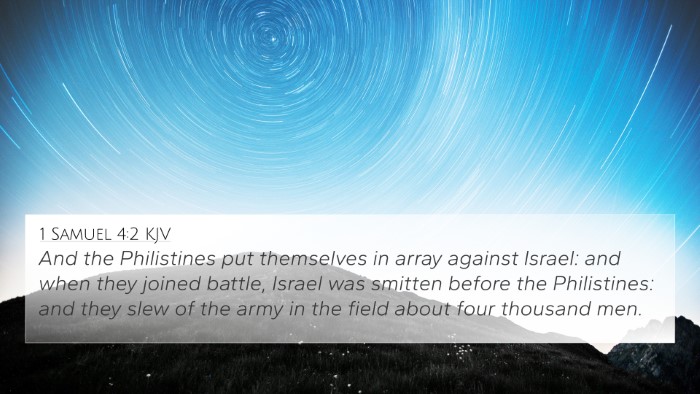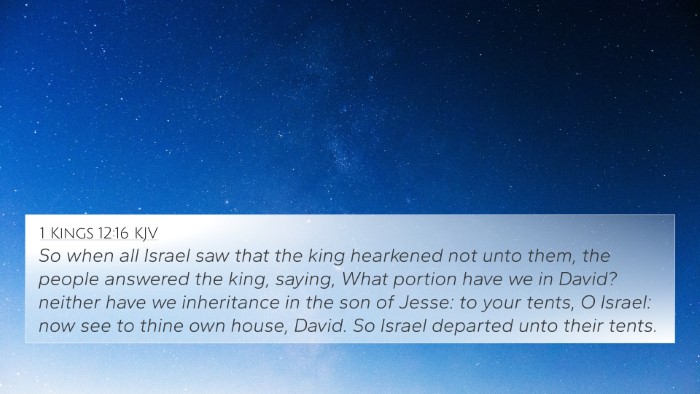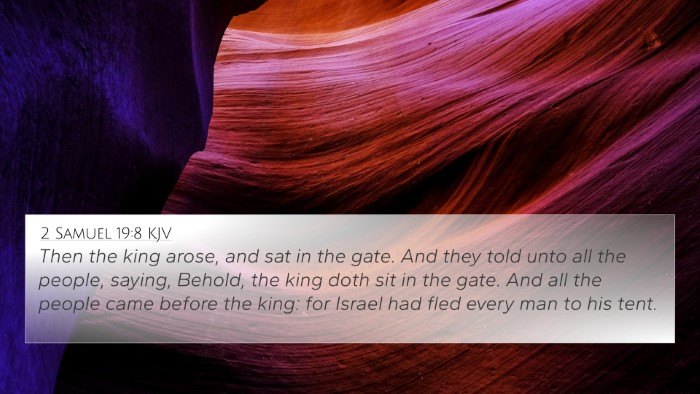1 Samuel 4:10 - Overview
This verse describes a pivotal moment in the history of Israel, where the Israelites suffered a significant defeat at the hands of the Philistines. It marks a time of turmoil for the nation, indicating both a physical and spiritual crisis. The phrase "the ark of God was taken" signals a profound loss of hope and divine favor.
Commentary Insights
The interpretation of 1 Samuel 4:10 reveals layers of meaning as gleaned from classical commentaries.
Matthew Henry's Commentary
Matthew Henry emphasizes the severity of the defeat, which was a result of the people's misplaced confidence. The Israelites relied on the ark of the covenant as a talisman rather than truly repenting and seeking God's guidance. This failure led to their downfall, illustrating that God does not work through superstition but through sincere faith and obedience.
Albert Barnes' Notes
Barnes points out the significance of the ark's capture by the Philistines. The ark represented God's presence among His people, and its loss symbolizes the withdrawal of divine protection. This was a wake-up call for Israel, urging them to repent and return to genuine worship of God, as true victory cannot be achieved without divine blessing.
Adam Clarke's Commentary
Clarke stresses the impact this event had on the Israelite psyche. Given that the Israelites saw themselves as God's chosen people, the defeat and the consequent capture of the ark were devastating. This moment highlighted their spiritual decline and the consequences of relying on external symbols of faith rather than nurturing an actual relationship with God.
Cross-References and Thematic Connections
1 Samuel 4:10 can be connected with several Bible verses that provide context and further understanding of its themes:
- Numbers 14:42 - God warns against moving without His command, similar to the Israelites’ faulty reliance on the ark.
- 2 Chronicles 15:2 - Highlights that God is with those who are with Him, paralleling the need for genuine faith.
- Psalm 78:60-61 - References God's relinquishment of the tabernacle to capture, emphasizing His displeasure.
- Jeremiah 7:4 - Warns against placing trust in physical symbols rather than a true, transformative faith.
- 1 Samuel 7:2-3 - Shows Israel's path to recovery through genuine repentance and seeking the Lord.
- Proverbs 3:5-6 - Encourages authentic guidance from God rather than reliance on one's understanding.
- Isaiah 59:1-2 - Discusses how sin separates us from God’s blessings, resonating with Israel's defeat.
Bible Verse Connections
The defeat of Israel at the hands of the Philistines serves as a reminder of a common Biblical theme: God's people must remain faithful to Him to experience His protection and victory. This theme is echoed in many scriptures, bridging the gap between different parts of the Bible.
Thematic Bible Verse Connections
The loss of the ark in 1 Samuel 4:10 can be linked to various themes throughout the Bible:
- Disobedience and Consequence - The cyclical pattern of sin leading to separation from God.
- The Role of Repentance - Highlighted in the approaches to the ark and the eventual redemption in later chapters.
- God's Sovereignty - Even in defeat, God's larger plan unfolds, as seen throughout Biblical narratives.
- Faith vs. Superstition - Many instances throughout the Bible indicate reliance should be on God, not objects.
Conclusion
1 Samuel 4:10 provides a historical narrative that reinforces critical themes of faith, obedience, and the consequences of failing to honor God. Understanding this verse in the light of cross-referenced scriptures fosters a deeper comprehension of the inter-Biblical dialogue and thematic connections within the Holy Scriptures, illuminating the importance of authentic faith combined with action.
Using tools for Bible cross-referencing, like a concordance or cross-reference guide, may facilitate a thorough study of these themes within both Old and New Testaments. It empowers readers to identify and understand connections like those in 1 Samuel 4:10, leading to enriched spiritual insights and a holistic view of scripture.


















